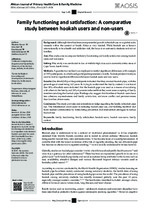Family functioning and satisfaction: A comparative study between hookah users and non-users
Date
2019Author
Roman, Nicolette
Rich, Edna
Davids, Charl
Benjamin, Fatiema
Taylor, Matthew
Metadata
Show full item recordAbstract
BACKGROUND: Although there has been an exponential growth in hookah use on a global scale, research within the context of South Africa is very limited. While hookah use is known internationally to be a health and addiction risk, the focus is on university students and not on families. AIM: This study aims to compare the family functioning and family satisfaction among hookah users and non-users. SETTING: This study was conducted in low or middle-high class socio-economic status areas of Cape Town, South Africa. METHODS: A quantitative method was employed to test for significant differences with a sample of 1193 participants, in which each participant represented a family. An independent t-test was used to test for significant differences between hookah users and non-users. RESULTS: One-third (34%) of the participants indicated that they smoked hookah pipe, with the general age of onset being 16.5 years. In trying to understand the family context, it was found that 28% of hookah users indicated that the hookah pipe was used as a means of socialising with others in the family, and 24% of parents indicated that they were more accepting of family members smoking the hookah pipe. Findings also suggest that families of hookah users have less cohesion, expressiveness and family satisfaction, and more conflict and permissiveness than families of non-users. CONCLUSION: This study provides and extends knowledge regarding the family in hookah pipe use. This information could assist in reducing hookah pipe use, and building healthier and more resilient communities by formulating prevention and intervention strategies to reduce hookah use.

